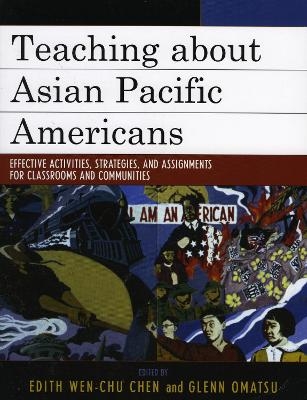
Teaching about Asian Pacific Americans
Rowman & Littlefield Publishers (Verlag)
978-0-7425-5338-5 (ISBN)
The number of Asian American students in schools and colleges has soared in the last twenty-five years, and they make up one of the fastest growing segments of the student population. However, classroom material often does not include their version of the American experience. Teaching about Asian Pacific Americans was created to address this void. This resource guide provides interactive activities, assignments, and strategies for classrooms or workshops. Those new to the field of Asian American studies will appreciate the background information on issues that concern Asian Pacific Americans, while experts in the field will find powerful, innovative teaching activities that clearly convey established and new ideas. The activities in this book have been used effectively in classrooms, workshops for staff and practitioners in student services programs, community-based organizations, teacher training programs, social service agencies, and diversity training. Teaching About Asian Pacific Americans serves as a critical resource for anyone interested in race, ethnicity, and Asian Pacific American communities.
Edith Wen-Chu Chen is associate professor in the Asian American studies department at California State University, Northridge. Her interests include race and ethnicity, Asian American women, intercultural communication, and Asians in the Americas. Glenn Omatsu is senior lecturer in Asian American studies and faculty mentor program coordinator for the Educational Opportunity Program at California State University, Northridge. He is co-editor (with Steve Louie) of Asian Americans: The Movement and Moment.
Part 1 Introduction Part 2 Part One: Definitions, Concepts, and Issues Part 3 Chapter One: Vietnamese Boat People: Separation and Loss Chapter 4 Straddling Two Social Worlds: The Experiences of Vietnamese Refugee Children in the United States Chapter 5 An Oral History of Huy Tran: A Vietnamese American Refugee's Story Part 6 Chapter Two: Feast of Resistance: Asian American History Through Food Chapter 7 Japanese Americans and Chick-Sexing Part 8 Chapter Three: Food and "Pin@y Time": Mapping the Filipino American Experience Chapter 9 Timeline of Filipino American History Part 10 Chapter Four: Deconstructing the Model Minority Image: Asian Pacific Americans, Race, Class, Gender and Work Chapter 11 Southeast Asian Refugees Groups and the Barriers They Face Part 12 Chapter Five: Building Allies: Linking Race, Class, Gender and Sexuality in Asian American Studies Chapter 13 Alan's Story: Female-to-Male Transexual Straight Man Part 14 Chapter Six: Globalization and Transnationalism Role-Playing Activity: Korean Immigrants and the Garment Industry Chapter 15 Globalizations' "Race to the Bottom" Creates Sweatshops Chapter 16 Sweatshops in Our Backyards Chapter 17 A Los Angeles Garment Worker's Experience Part 18 Chapter Seven: Expressive Therapies for Asian American Clients: The Value of Nonverbal Sand Tray Therapy Part 19 Chapter Nine: Representations of Asian Americans in Advertising: Constructing Images of Asian Americans Part 20 Chapter Ten: Ripping Up Culture: Helping Students Reconnect with Their Cultural Values Part 21 Part Two: War, Colonialism, and Imperialism Part 22 Chapter Eleven: Paradise and the Politics of Tourist Hawai'i Chapter 23 From a Native Daughter: Colonialism and Sovereignty in Hawai'i Part 24 Chapter Twelve: Racializing the "Enemy": Japanese Americans after 12/7/41 and American Muslims and Arabs after 11/9/01 Chapter 25 After September 11, 2001: An Asian Pacific American Perspective Part 26 Chapter Thirteen: Teaching about Muslims and Hindus in the USA: "And all they will call you will be deportee" Chapter 27 Hate Crimes Immediately after September 11, 2001 Part 28 Chapter Fourteen: On the Cursings and Blessings of War: Discussions for a Filipino American Experience Class Chapter 29 Filipinos and the "Negritos Americanos": Empire and Racial Bonds Part 30 Chapter Fifteen: Addressing Redress: Japanese Americans Reparations for Their Internment During World War II Part 31 Part Three: Community Building, Learning, and Organizing Part 32 Chapter Sixteen: Making Student Leadership Development an Integral Part of Our Classrooms Part 33 Chapter Seventeen: Beyond the Egg Roll, Fortune Cookies and Paper Fans: Seeing the Residential SIde of Chinatown Part 34 Chapter Eighteen: Mobilizing Students to Respond to Community Needs—Organizing a Class around a Community Project Part 35 Chapter Nineteen: Bridging Generations: Bringing the Experiences of Illness, Health, and Aging into the Classroom Part 36 Chapter Twenty: Oral History and Multiculturalism Part 37 Chapter Twenty-One: Bridging Asian American and African American Communities Part 38 Chapter Twenty-Two: Political Tours of Our Communities: Linking "Book Knowledge" with "Lived Experiences" Part 39 Part Four: Critical Thinking Teaching Strategies Part 40 Chapter Twenty-Three: Understanding Privilege in American Society Part 41 Chapter Twenty-Four: An Exploration of Meaning: Critically Thinking about History Part 42 Chapter Twenty-Five: Generative Thinking: Using a Funding Proposal to Inspire Critical Thinking Part 43 Chapter Twenty-Six: Promoting Transgressions through the Automatic Reward System in the Literature Course Part 44 Chapter Twenty-Seven: What's Wrong with a Colorblind Perspective: A New Model of Critical Caring for Teachers Part 45 Chapter Twenty-Eight: Modeling Whiteness: Minorities, Assimilation and Resistance Part 46 Part Five: Resources Part 47 Chapter Twenty-Nine: Web Resources for Teaching Asian American Studies Part 48 About the Editors Part 49 About the Contributors Part 50 Index
| Erscheint lt. Verlag | 25.7.2006 |
|---|---|
| Reihe/Serie | Critical Perspectives on Asian Pacific Americans |
| Co-Autor | Allan Aquino, Asian Pacific American Legal Center, Wayne Au |
| Verlagsort | Lanham, MD |
| Sprache | englisch |
| Maße | 216 x 280 mm |
| Gewicht | 934 g |
| Themenwelt | Schulbuch / Wörterbuch |
| Sozialwissenschaften ► Pädagogik | |
| ISBN-10 | 0-7425-5338-8 / 0742553388 |
| ISBN-13 | 978-0-7425-5338-5 / 9780742553385 |
| Zustand | Neuware |
| Haben Sie eine Frage zum Produkt? |
aus dem Bereich


